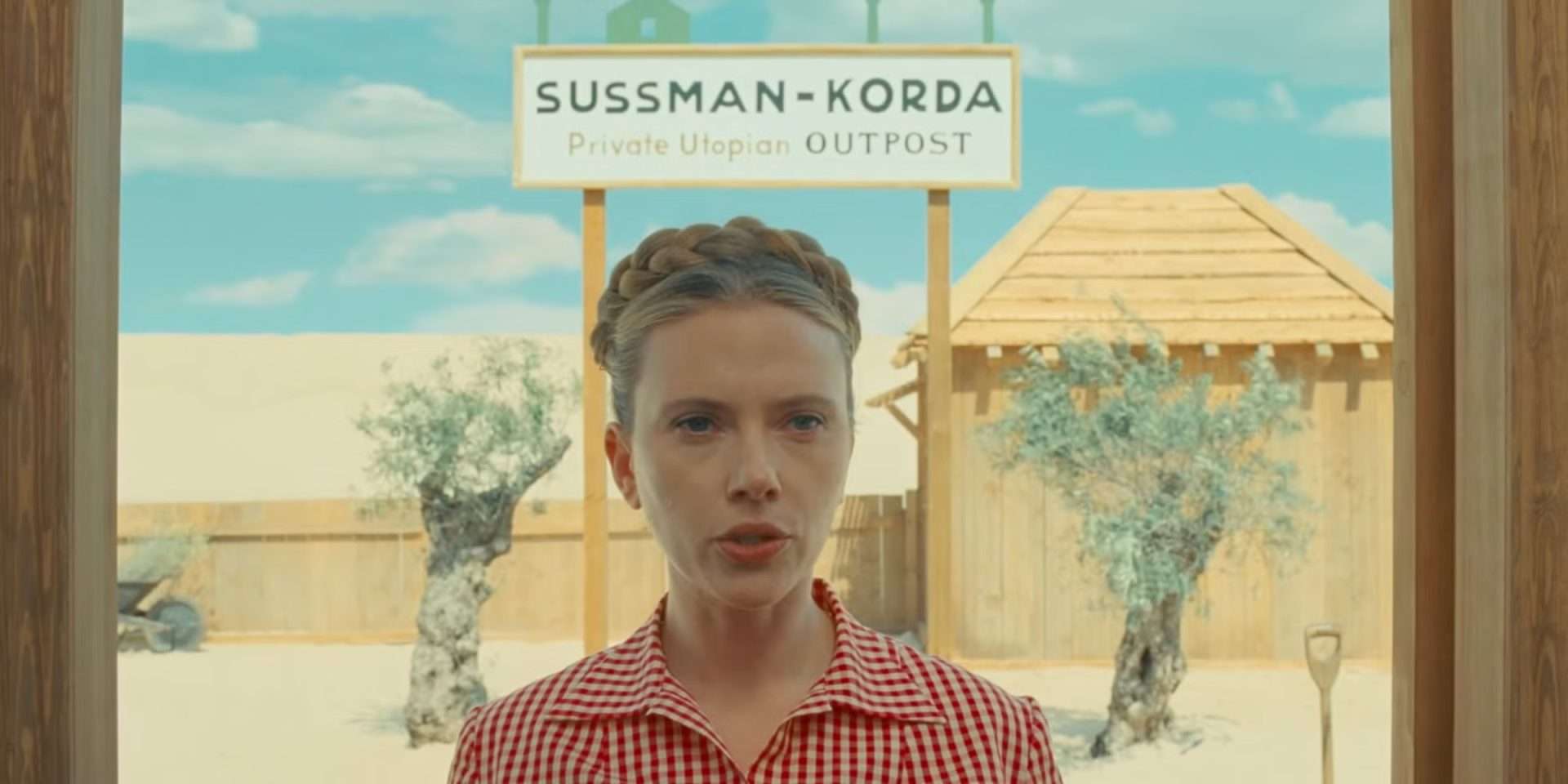Wes Anderson is a filmmaker whose trademark style is entirely distinct, drawing both admiration and frustration from those who have noted the similarities within his work. Anderson’s symmetrical composition, matter-of-fact dialogue, and hand-crafted architecture may give all of his films a similar aesthetic, but there has been a great diversification within the types of genres that he has tackled.
Within the last decade of his career, Anderson’s ambitions have turned international. “The Grand Budapest Hotel” was a wholesome celebration of a passing pre-war era, “Isle of Dogs” spotlighted the figures of a revolution, and “The French Dispatch” offered an anthology of stories that celebrated the importance of international journalism.
The one exception to this transition was Anderson’s last feature, “Asteroid City,” which reverted to the more familial themes that dominated his early work on “The Royal Tenenbaums” and “Fantastic Mr. Fox.” Anderson’s newest film, “The Phoenician Scheme,” merges this intimate family drama with a rip-roaring adventure that breezes through the spectacle of Old Hollywood. While not quite as emotionally dense as “Asteroid City” or as politically profound as “The Grand Budapest Hotel,” “The Phonecian Scheme” is an encouraging step forward for Anderson, and is also one of his funniest films ever.
While Benicio del Toro is an actor most closely associated with dark, brooding anti-heroes, he is cast in “The Phonecian Scheme” as Zsa-zsa Korda, an eccentric billionaire who tasks himself with determining the future of his empire. Despite having nine sons (including a few that were adopted), Korada decides to appoint his daughter, Liesel (Mia Threapleton), as his heir, even though she is studying to be a nun. Accompanied by the charming tutor Bjørn Lund (Michael Cera), Korda and Lisel meet with many of his co-financiers as they determine how his wealth will be dispersed.

The notion of contract negotiations as a narrative hook may not seem appealing, but Anderson constructed a story in which various actors are given the opportunity to give scene-stealing performances. The pacing in “The Phoenician Scheme” is kinetic, even by Anderson’s standards, as there is an urgency for Korda to slowly win over his fellow investors.
As is often the case, Anderson’s cinematic influences are quite varied. He combines the sweeping adventure of “The Thief of Baghdad,” the international discovery of “Raiders of the Lost Ark,” the colorful characters of “The Pirate,” and the religious ethics of “Black Narcissus” into a transfixing old-fashioned romp.
While it lacks the dense framing device that turned “The Grand Budapest Hotel” and “Asteroid City” into “stories within stories,” there is clever staging of the supposedly “objective” morality of divine figures, who offer their own observations on the decisions that Korda makes. It’s not essential to the narrative, but it hints at the larger themes of personal evolution and societal reconfiguration that turn “The Phoenician Scheme” into more than just a fun series of escapades.
“The Phoenician Scheme” isn’t going to conjure tears in the way that “Moonrise Kingdom” did, but the joke ratio is astoundingly high. Anderson’s whip-smart dialogue, matched with the amusingly straightforward character motivations, results in some of the most inventive gags he has ever created.
Also Related: All Wes Anderson Films Ranked
At the center of “The Phoenician Scheme” is an analysis of the value of logic; while it is often used as a crutch on which to justify greed, looking at issues from a pragmatic perspective can result in an understanding of why charity is both a strategic and moral necessity. While Korda’s odd rules and standards have placed a burden on his relationships, he shows a willingness to evolve and takes great lengths to right the wrongs of his past.
It is suggested that Korda may have come to these conclusions on his own, but it was the insistence of his daughter that he be encouraged to be so liberal. The wealth of these characters is not lionized, as Anderson explores the responsibility that comes with their considerable privileges. At the same time, the presence of Bjørn provides the necessary outsider’s perspective.
While del Toro’s rapid-fire line delivery and surprisingly dynamic physical humor keep the energy of “The Phoenician Scheme” consistent, it’s the breakout performance by Threapleton that gives the film its heart. Anderson often utilizes his blunt, comically expository dialogue as a means of subtly breaking the fourth wall, but Liesel is an interesting character who is clearly above the shenanigans that she is dragged into. Though she’s rarely nasty and never judgmental, Liesel’s ethical endorsement is what each of the most powerful parties in “The Phoenician Scheme” strives for.
The father-daughter dynamic is surprisingly touching, as it’s through professional unsentimentality that Liesel and Korda express their shared affection for one another. Perhaps, a more open-hearted expression of adoration wouldn’t be possible for them, given their wildly different upbringings; rather than making unsubstantiated changes to his characters’ inherent flaws, Anderson offered them an opportunity to form a compromise.

The flat, detail-oriented nature of the dialogue is clearly an homage to classic espionage and caper films, which makes the more openly comedic performance from Cera even more essential. Cera is an actor whose idiosyncrasies are so signature that it’s surprising that “The Phoenician Scheme” marks his first collaboration with Anderson; although he succeeds in ensuring that he’s playing more than a broad caricature, Bjørn becomes increasingly nuanced after a series of genuinely shocking revelations.
Anderson rarely fails to put together a robust cast, and “The Phoenician Scheme” gathers many of his former collaborators, whilst offering them the opportunity to try something new. Bryan Cranston and Tom Hanks are paired off in an amusing competition scene, and Jeffrey Wright shows the capacity of his charisma in one of the film’s most amusing collaborations.
While some of the cameos ultimately feel more like sight gags, Anderson also allows some of his more trusted stars to deepen antiquated stereotypes by proving more depth. Riz Ahmed’s role as a dashing prince, Richard Ayoade’s performance as a jungle-based revolutionary, Benedict Cumberbatch’s appearance as a ruthless aristocrat, and a villainous conspirator played by Rupert Friend, every minor character in “The Phoenician Scheme” leaves a memorable impression.
While it’s breezy and blissfully devoid of melodrama, “The Phoenician Scheme” reaches one of Anderson’s most profound conclusions. He might be a filmmaker who is often drawn to stories that he can wrap up with a perfect bow, but Anderson shows a willingness to accept the uncertainties in life. “The Phoenician Scheme” is often thought-provoking, but it’s best considered as an elevated form of pure entertainment.
Read More: 20 Best Investigative Journalism Movies, Ranked
Editor’s Note: The Phonecian Scheme releases in theaters on June 6, 2025.




![All You Can Eat Buddha [2017]: ‘TIFF’ Review](https://79468c92.delivery.rocketcdn.me/wp-content/uploads/2017/09/TIFF_HIGH_ON_FILMS_All_You_Can_Eat_Buddha_01-768x384.jpg)
![Baar Baar Dekho [2016] : As confused as the protagonist!](https://79468c92.delivery.rocketcdn.me/wp-content/uploads/2016/09/BAAR4-768x458.jpg)

![Huda’s Salon [2022] Review: A tense, heavy-handed thriller that escalates uneasily](https://79468c92.delivery.rocketcdn.me/wp-content/uploads/2022/03/HUDAS-SALON-Still-2-768x511.jpg)
![Still Walking [2008]: Hirokazu Kore-eda’s Elegiac Masterpiece](https://79468c92.delivery.rocketcdn.me/wp-content/uploads/2017/06/aruitemo-768x396.jpg)